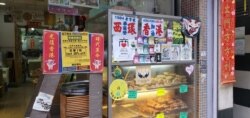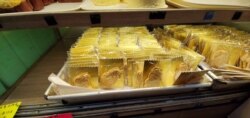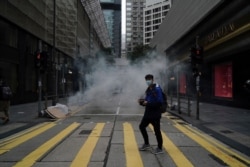Pro-democracy patrons of a bustling Chinese New Year market touting locally made goods chanted “Reclaim Hong Kong! Revolution of our era!” at closing time recently in a show of support for the ongoing anti-government movement.
Festive red paper strips with slogans calling for democracy and freedom adorned the street at the unlicensed market in Sai Ying Pun, where vendors sell everything from New Years party snacks to pottery to organic soaps. Stall owners and shoppers vowed to cooperate to reduce their economic reliance on China in this once-sleepy neighborhood that has become gentrified with trendy restaurants and bars.
A man handed out a smartly printed pamphlet titled “Anywhere But China,” a guide to the brands of coffee, tea, yogurt, milk and juice are Chinese-made and should be boycotted, and those that are not.
Hong Kong has splintered since protests started last year, with people divided into the “yellow” – pro-democracy – or “blue” – pro-government or pro-China – camps, and so are businesses. Consumers can even check lists of stores and restaurants seen as pro-democracy or pro-government on mobile apps.
Many pro-democracy Hong Kongers are forming the “yellow economic circle” -- an informal group of businesses that constitutes retailers and restaurants sympathetic to the pro-democracy movement -- allowing consumers to use their wallets to further the movement's momentum and, they hope, weaken China’s economic dominance.
China is the main supplier of Hong Kong's necessities, including water, meat and vegetables, and many businesses in the city’s real estate, banking, media and telecommunications sectors run on Chinese capital.
But economic dependence has not failed to ensure political harmony. Pro-democracy protests, sparked by a controversial extradition bill in June, have precipitated violent confrontations between police and protesters that resulted in some 7,000 arrests and numerous injuries.
Weary supporters of the movement are reflecting on the price they have paid.
“We’re all tired of the violent conflicts, which have left everyone devastated. But the fight is about Hong Kong’s future and our freedoms, so we can’t give up,” said a businessman surnamed Chan, who bought Lai See packets -- red envelopes used to hold a traditional New Year's gift of money for children – emblazoned with pro-democracy messages from a group raising money for young protesters facing financial hardships, especially those who have fallen out with their families.
"I don’t know if this [the yellow economic circle] initiative would work, but we must keep up our pressure on the government,” said Chan, who said he now makes sure he patronizes yellow shops and restaurants as much as possible. “What else can we do?” he asks.
Rock Tam, who has extinguished burning tear gas canisters lobbed by police at protesters throughout the summer months, said he now tries to support the movement in less risky ways.
“Several people I know got arrested and the police got hold of their phones,” he said, adding he worried that police were now watching him as well. “We have to be more careful.” he said.
Instead, he shows his support for protesters by handing out flyers and giving protesters discounts at the bar where he works. “Our business actually went up by 20%,” he said.
A consortium of eateries sympathetic to the pro-democracy movement called HKEconRim offers discounts to customers patronizing their restaurants, bakeries and cafes. Wah Yee Tang bakery, part of the consortium, makes cookies shaped in cartoon figures popularized in recent protests on the premises. It uses only local flour, Australian butter and South Korean sugar.
Owner Naomi Suen said she hopes her products will “boost the morale of fellow Hong Kongers.”
The yellow economic circle initiative has drawn fire from authorities. A commentary in the People’s Daily, the mouthpiece of the Communist Party, accused it of seeking to ruin Hong Kong’s economy.
“It’s barbaric, coarse and full of anti-social, anti-civilization tendencies,” the commentary said.
Hong Kong’s Commerce and Economic Development secretary, Edward Yau, dismissed the initiative as unsustainable, saying no economy can decide who it wants to include or exclude.
Economists say the “yellow economy,” mainly dining and retail businesses, will have a limited impact on the city’s key industries – finance, tourism, trading and logistics -- which are dominated by China-linked businesses.
However, although the movement's effect on the overall economy may be limited, the initiative will still succeed in “informing and educating citizens about the prevailing politico-economic hegemony,” said Professor Kenneth Chan, a political scientist at Baptist University of Hong Kong.“
It will also provide ways for people who are not happy with the situation to express their views through the yellow economy,” he said.









